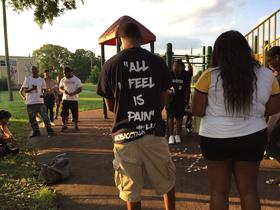
The sun is starting to sink on a humid summer evening when a crowd of friends and family members link arms, holding candles. Drops of hot wax spill onto the grass at a park across the street from where Daniel Hambrick was shot one year ago.
Hambrick’s cousin, Dominique Appleton, clutches a bright yellow fire pole on the jungle gym, where children play behind her. She wonders what was running through the officer’s mind when he fired the fatal shot.
“When the police officer killed him, I wonder what scared him more,” she says. “The fact that his back was turned or the speed that Daniel was going? I mean, are y’all scared of that?”
Appleton has spent the past year struggling to make sense of that moment. Her family has sued the city for $30 million. They claim Nashville police are racially biased and blame the department for his death.

“My victory, is him coming back. But it’ll never bring him back,” Appleton says. “So the only thing we can do is continue to shed light on this situation and let people across the world know that this cannot continue to happen: people getting killed, black men getting killed for no reason, because of an assumption.”
A Year Of Mixed Progress
A year has passed since a Metro police officer shot and killed Hambrick during a foot chase in North Nashville. Community members marked the anniversary with a vigil Friday night.
The anniversary also marked a year of mixed progress for community-police relations.
A year after the shooting, tensions are still high between police and criminal justice reform advocates. And two years after the city allocated funds for body cameras, police still aren’t wearing them.
As Hambrick’s mother,
Vickie Hambrick and Sheila Clemmons Lee, the mother of another black man killed by a Nashville police officer, clutch one another, wailing in grief, activist D.J. Hudson says they wish they didn’t have to work so hard to prevent police misconduct.

“I’m tired. I’m tired of having to do this,” D.J. says, crying. “I’ve been calling people’s names and marching and fighting and organizing and making calls and begging people to do anything they can to stop this. We should not have to do this.”
But activists says they’ve seen some progress in the past year.
Hambrick’s death pushed forward a years-long movement to form an independent civilian oversight board that will investigate allegations of police misconduct.
In the week after Hambrick’s shooting, organizers got the thousands of signatures they needed to put the issue on the ballot. Voters approved the measure with sweeping margins, and an 11-person commission was selected in January. They’ve already launched three independent reviews.
Officer Andrew Delke has also been indicted with a charge of first-degree murder. He’s pled not guilty and awaits trial.
It’ll take time for Delke’s case to wind its way through the court system. His next hearing is scheduled for late August, but based on similar cases in other cities, the trial could be years away.
Samantha Max is a
Report for America corps member.


